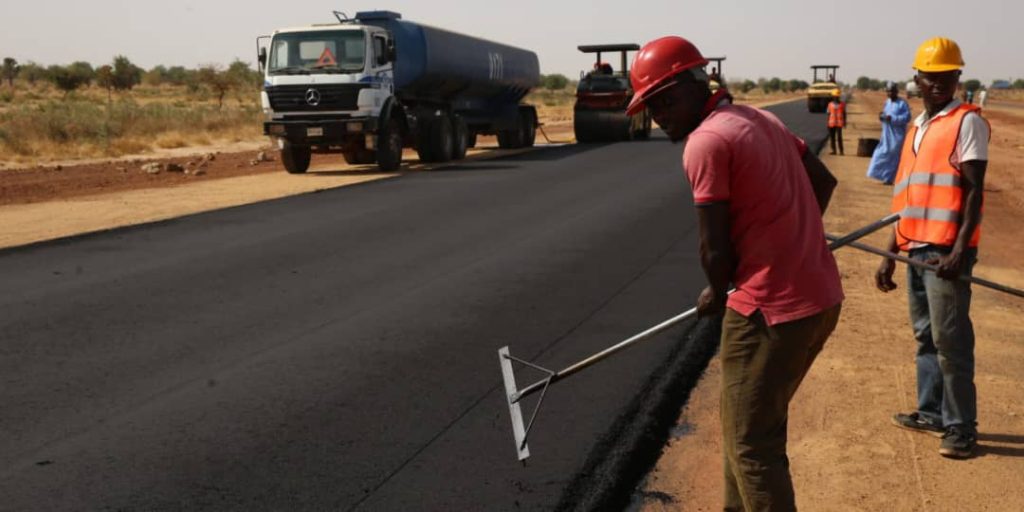
Daniel Otera
For travellers journeying from Suleja in Niger State to Minna, what should be a smooth one-and-a-half-hour drive has become a harrowing seven-hour ordeal. Tankers crash. Buses tip over. Precious hours are lost. And, tragically, lives too.
After more than a decade of delays, poor construction work, and failed contracts, the Federal Government has finally declared the Suleja–Minna dual carriageway an emergency project.
During a site inspection over the weekend, Minister of Works, David Umahi, did not mince words. He described the condition of the road as “in a very terrible situation, delaying travel time by seven hours instead of an hour and a half, and vehicles are falling and killing people.”
The Suleja-Minna road project was originally awarded to Salini Nigeria Limited, a major construction firm with several federal road contracts. However, according to Umahi, the company either abandoned the project or executed it poorly. Despite 18 months of pressure on Salini to return and make repairs, there was no progress.
“Contractors are engaged and paid, yet we don’t have value for money,” Umahi said. “That is wickedness, because our people will not continue to suffer like this.”
Officially, the project was inherited from the Buhari administration. Salini received funding, but Umahi insists that the work carried out failed to meet even minimum engineering standards. Alarmingly, he added that some individuals within the government are still lobbying for the company to continue with the project.
President Bola Ahmed Tinubu reportedly intervened directly following a complaint by Governor Mohammed Umar Bago of Niger State. According to Umahi, Tinubu ordered the Ministry of Works to treat the road as a priority.
“The president directed that urgent action should be taken, and that is why we are here. I have declared these sections one and two emergency projects,” Umahi announced.
He warned that, “when we go through due process and award the job, if the contractor waits for one day for mobilisation, I will terminate it because it’s an emergency one.”
According to figures from the Federal Ministry of Works, the Suleja–Minna road spans 103 kilometres of dual carriageway, or 206 kilometres in total lane coverage. The road is vital to national logistics, linking Abuja to Niger and the North-West, and serving as a critical route for food, fuel, and trade.
Under the previous administration, the federal government earmarked ₦103 billion for the road’s dualisation. However, by mid-2025, only about 60 kilometres had been completed—not by Salini, but by CCCC International Engineering Nigeria Ltd, under Governor Bago’s urban renewal programme.
Reports from communities along the corridor including Farin Doki, Kwakuti, and Dikko Junction have highlighted recurring tanker explosions, road collapses, and kidnapping incidents. These prompted a series of petitions from residents to government agencies.
A 2023 report by Daily Trust described the highway as a “death trap,” blaming poor construction and stalled progress for a surge in insecurity and fatal accidents.
Minister Umahi confirmed that Salini’s contract has been irrevocably terminated, citing poor performance. He revealed that two new contractors are now handling the reconstruction.
One of them, CCCC International Engineering Nigeria Ltd, is already working on the project through Niger State’s urban renewal initiative. According to Umahi, CCCC has completed 60 kilometres, with about 146 kilometres remaining.
“The governor has asked us to allow the CCCC that has started part of the project to continue,” he said.
The Ministry of Works has issued a 10-day deadline to CCCC to mobilise and begin reconstruction of the most dangerous 7-kilometre stretch.
“This is emergency procurement. Work begins first, then pricing is verified by the Bureau of Public Procurement,” Umahi clarified.
Beyond terminating the contract, Umahi disclosed that Salini is still indebted to the Federal Government for portions of the project that were either abandoned or structurally defective. The ministry has ordered the firm to complete sections equal to the value it owes.
“If Salini fails to comply under our supervision, we will invite the Economic and Financial Crimes Commission (EFCC) to recover public funds,” Umahi warned.
He added: “There is no going back. This fight is a fight for Nigerians, and we have no regrets doing this.”
According to the National Bureau of Statistics (NBS), Nigeria recorded over 1,300 road traffic deaths in the fourth quarter of 2023 alone. The North Central zone, which includes Niger State, accounted for the highest number of fatalities.
Throughout 2023, the Federal Road Safety Corps (FRSC) reported over 5,000 deaths and 31,000 injuries from 10,617 crashes nationwide. Transport experts and civil society groups continue to blame poor road conditions especially along high-risk routes like Suleja–Minna for many of these incidents.
“It’s a national emergency. That road is not just a transport link, it’s a lifeline for farmers, traders, and daily commuters. Every day it remains in disrepair, more lives are lost,” said Ayo Oni, a public infrastructure advocate with the Track Governance Initiative in Lagos.
The Niger corridor, according to NBS data, remains one of the deadliest transport zones in the country, underscoring the urgency behind the Tinubu administration’s emergency declaration.
The Suleja–Minna road tells a familiar Nigerian story: budgeted but unbuilt, awarded but abandoned, critical but neglected. What makes this moment different is not just the emergency label but the political will, public scrutiny, and rising death toll.
If emergency action does not deliver real results this time, more than contracts will be lost. More lives will.
